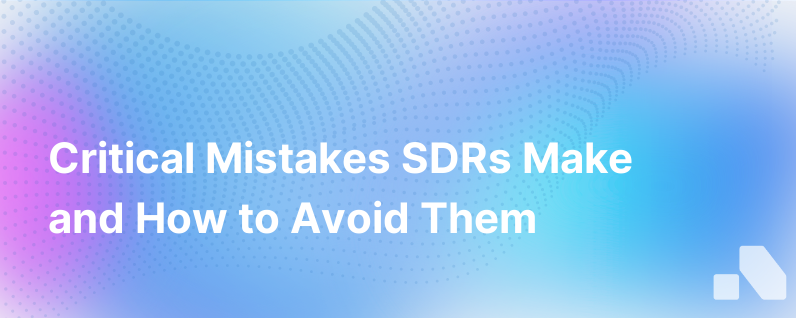Worst Things Sdrs Do
Published on August 1, 2023 by Sawyer Middeleer
Sales development representatives (SDRs) are vital to the success of any organization’s sales process. They serve as the bridge between marketing-generated leads and the sales team, tasked with qualifying leads before they're passed along to account executives (AEs). However, the role, which often involves high call volumes and metric pressures, can sometimes result in less than ideal practices.
Here's a look at some of the common pitfalls that SDRs can fall into and how these missteps can adversely affect prospects, the sales team, and the organization as a whole.
Over-Prioritizing Quantity Over Quality
Quantity vs. Quality In an attempt to hit metrics or under the pressure of management, SDRs may prioritize quantity over quality. This could lead to bombarding prospects with calls and emails without proper research or personalization, which can be ineffective and potentially damage the brand’s reputation.
Speed Over Substance Rushing to push leads through the funnel without thoroughly qualifying them can create friction later in the sales process. It’s crucial for SDRs to take the time to ensure that a lead has a genuine interest or need before passing it along to sales.
Lack of Personalization
Cookie-Cutter Communication Generic messaging is a major turnoff for prospects who are inundated with sales pitches. Failing to personalize outreach efforts shows a lack of effort and understanding of the prospect's unique pains and needs.
Failure to Research When SDRs don’t research a prospect and their company before reaching out, they miss the opportunity to connect in a meaningful way. Demonstrating knowledge of the prospect’s business challenges fosters rapport and trust.
Insufficient Product Knowledge
Surface-Level Understanding To effectively sell a product or service, an SDR should have a deep understanding of its features, benefits, and the specific problems it solves. Skimming the surface can lead to miscommunication and ultimately, mistrust.
Unprepared for Objections When SDRs lack product knowledge, they're also less likely to handle objections confidently. This can result in lost opportunities as they're unable to provide convincing responses that alleviate concerns.
Ignoring Prospect Needs
Pushing a Hard Sell There’s a delicate balance between persistence and pushiness. Pushing too hard for a sale without listening to and addressing the prospect's needs can come across as aggressive and discourage potential buyers.
Lack of Empathy Empathy is a crucial skill for SDRs. Failing to understand or address a prospect's unique situation or pain points is a surefire way to lose their interest.
Poor Follow-Up Practices
Lack of Timeliness Follow-up is key. Taking too long to respond to a prospect's inquiry can not only convey a lack of interest but also give competitors an opening to step in.
Not Honoring Commitments If an SDR fails to send promised information or doesn’t follow up as indicated, this can severely damage credibility and trust, and therefore, the potential sale.
Not Utilizing Technology Effectively
Inefficient Use of CRM A CRM system can be a goldmine for SDRs, yet underutilizing this tool or failing to keep it updated with relevant information results in missed opportunities for effective follow-up and personalized communication.
Spamming Prospects Automation tools are great for efficiency, but over-automation or misuse — such as indiscriminate email blasting without segmentation — can lead to prospects feeling spammed and disrespected.
Failing to Work Synergistically with Sales and Marketing
Lack of Alignment on Goals SDRs operate between marketing and sales, and misalignment with either can lead to mixed messages and a disjointed experience for the prospect.
Not Sharing Insights SDRs are often the first point of human contact and are thereby positioned to gather valuable insights. Failing to communicate this feedback to marketing and sales can impede organizational learning and improvement.
Failing on Professionalism
Inappropriate Reactions SDRs may sometimes face rejection or frustration on calls. Reacting unprofessionally or taking it personally can tarnish the reputation of themselves and their company.
Inadvertently Misleading Prospects Whether intentional or not, providing incorrect information or making exaggerated claims can come back to haunt an organization, leading to unhappy customers and lost business.
Conclusion
Recognizing and addressing these pitfalls is key for SDR success and for the health of the sales organization. Training programs should emphasize the importance of quality over quantity, thorough research and personalization, deep product knowledge, sharp listening skills, empathetic engagement, timely and relevant follow-up, effective use of technology, and synergy with marketing and sales. It's also vital to foster a culture of professionalism and continuous learning.
For organizations looking to streamline the process and mitigate such risks, platforms like Aomni can provide significant advantages. They help SDRs get real-time account research, competitive insights, and personalized sales content quickly, allowing reps to focus on creating meaningful connections with prospects and elevating their sales strategies. This technology can augment the capabilities of SDRs, helping them avoid common mistakes and concentrate on what they do best — building relationships and qualifying leads.